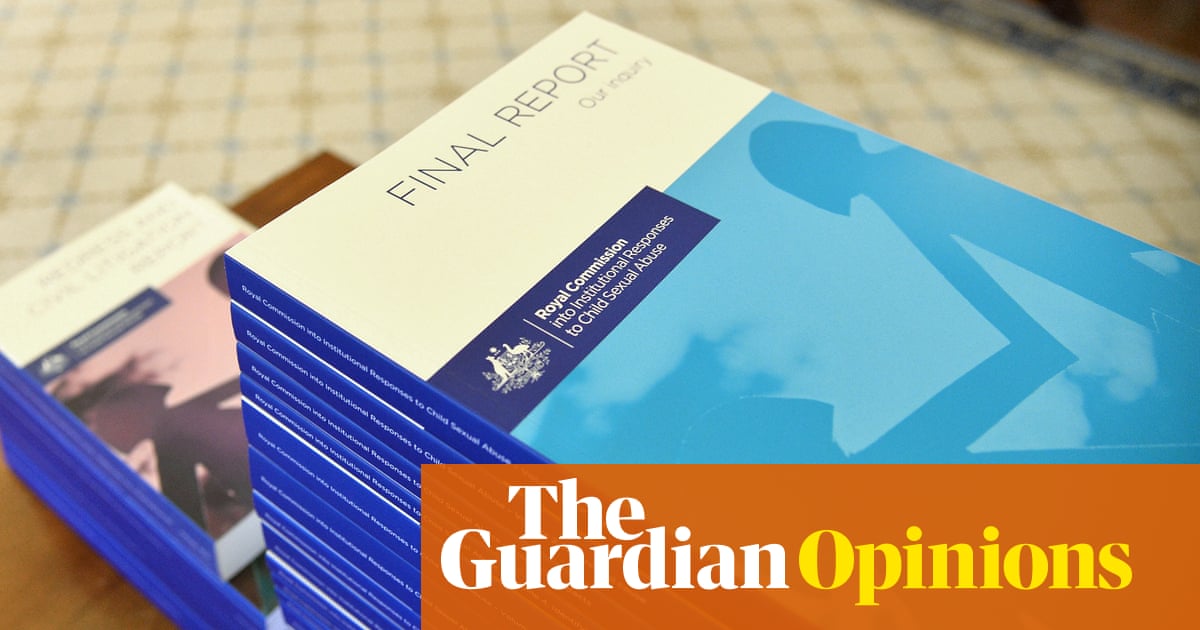Child sexual abuse is a global public health crisis that directly or indirectly affects every single human being on the planet and costs taxpayers billions of dollars each year. Its lasting harms are wide-ranging, complex, amorphous, generational.
In Australia, one in five boys and one in three girls are sexually abused before the age of 18. One in 10 men have a history of offending against children, online or offline. The most common adult perpetrator is a caregiver in the home. Child sexual abuse accounts for at least half of prosecuted sexual offences in this country. If you aren’t a victim-survivor, perpetrator or both, the chances are you love someone who is.
Eight years ago, the royal commission into institutional responses to child sexual abuse made a gamut of recommendations to address the problem from every angle. Among them was provision of national support services for non-offending family members of child sexual abuse offenders, who are typically left devastated and traumatised once the offending is revealed, as well as an early intervention service for people concerned about their sexual interest or behaviour towards children. Both measures feature in the 2021 National Strategy to Prevent and Respond to Child Sexual Abuse and its corresponding national action plan, overseen by the National Office for Child Safety (NOCS) – which falls within the Attorney-General’s Department.
These services are designed to fill major gaps in the Australian response to child sexual abuse. And although tenders for these services were supposed to go to market in 2022, they weren’t opened until a year later. They closed in February 2024. As of today, no contract has been signed for the delivery of these vital services. The process has been so protracted, unethical and mishandled that it warrantedan independent auditconducted by the Australian National Audit Office (Anao).
The Anao report, released last week, found that the Attorney-General’s Department is failing in its duty to deliver essential services to prevent sexual abuse before it occurs and support affected families. The procurement process was found to be flawed in multiple ways. Perhaps most alarmingly, the highest scoring tender for family support services was inexplicably struck out in favour of the second ranked tender. Out of 11 tenderers, seven failed to comply with one or more of the assessment criteria. In sourcing consultants for the procurement process, the department was found to have engaged in non-competitive practices, contravening its own commonwealth procurement rules.
Despite these shortcomings, the Attorney-General’s Department is insisting that the audit will not change the outcome of the tenders. While the department’s excuse for the delays is that these are “complex” services, it is demonstrably unfair to apportion blame to the sector. The problem isn’t an absence of services or experts able to manage complexity, it’s government incompetence and insufficient funding.
More to the point, regardless of the reason, the dire consequences of the delays extend far beyond the service providers and traumatised consumers in need. There is an unknown but guaranteed number of children who have suffered otherwise preventablesexual abuse as a result.
In any other area of national crisis and priority, the contracting and delivery of critical services is unlikely to be so drawn out and poorly handled. How could something so widespread and urgent be treated with such blatant disregard? Because child sexual abuse is ugly, uncomfortable and impossible to sanitise for the mainstream.
The bleak reality of child sexual abuse is that it cannot be easily communicated in glossy advertising campaigns or public education programs. The fact is, people with a sexual interest in children need options to stop them before they offend, because the moment they take that step, they leave behind a trail of destruction that includes not just their victims and their families, but their own devastated partners and children.
The need for robust, specialised child sexual abuse intervention and prevention services could not be more apparent. Australia has had no national support for non-offending family members of child sexual abuse perpetrators for more than two years. After a police raid removes every device from a family home, who supports the mother? What does she do with her trauma? How does she care for her children? Who do the children of parents who’ve offended call?
The service models that Australia needs already exist. They’ve been built by experts, refined over years, and proven to work. Hope lies there, and with the stalwart frontline workers and advocates across the country who will keep fighting for funding because we believe that preventing child sexual abuse is a worthy and achievablegoal that benefits all of us.
In Australia, the crisis support serviceLifelineis 13 11 14. If you or someone you know is affected by sexual assault, family or domestic violence, call 1800RESPECT on 1800 737 732 or visitwww.1800RESPECT.org.au. In an emergency, call 000. International helplines can be found viawww.befrienders.org. The Stop It Now! helpline is 1800 011 800.
Grace Tame was the 2021 Australian of the Year, and is director of the Grace Tame Foundation
This article has been co-signed by: Prof Michael Salter, director of the Childlight East Asia and Pacific Hub at UNSW; Prof Jon Rouse APM, Childlight East Asia and Pacific Hub at UNSW and AiLECs Lab Monash University; Hetty Johnston AM; Rosie Batty AO; Rachel Green, CEO of SANE; Natalie Walker, PartnerSPEAK founder
